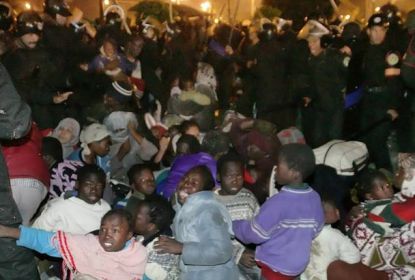Humanitarian aid must be delivered through South Sudan and Ethiopia – SPLM-N rebels
August 28, 2012 (KHARTOUM) — The Sudan People’s Liberation Movement–North (SPLM-N) accused Khartoum government of hampering the humanitarian access to the civilians in its controlled areas and announced they will ask to deliver the aid through the neighbouring South Sudan and Ethiopia.

According to this agreement, an assessment mission had to be dispatched to these areas within two weeks after the signing of the agreement and the operation should start a week after.
Also, the deal provides that the operation will be under the supervision of Sudanese authorities till the last position just before to penetrate in the rebel areas where the food will be distributed by aid workers under the control of African and Arab monitors.
However, Sudanese officials expressed concerns over the one-month humanitarian ceasefire included in the deal, saying the cessation of hostilities should just last for days or hours according to the course of the operation, from a village to another.
They explained their fears by referring to a similar humanitarian ceasefire signed in April 2004 with the rebel groups in Darfur saying the insurgents, at the time, reinforced their positions during the truce.
The SPLM-N said Tuesday in a statement released after a meeting of its leadership council that its negotiating delegation will demand on 4 September to deliver international humanitarian assistance to the civilians through Ethiopia and South Sudan.
The SPLM-N, which has accused Khartoum of obstructing the operation, rejected stipulations included in the agreement saying that the assistance should be delivered only from Sudanese territory and to respect Sudan’s sovereignty over the rebel held areas during the whole operation.
“No national sovereignty for war criminals,” the statement said.
Sudan was refusing the delivery of humanitarian aid to rebel areas saying it would benefit to the SPLM-N combatants.
Also, Khartoum announced it is not responsible for the safety of aid workers in the war zones in Blue Nile and South Kordofan following statements by US officials suggesting that Washington would deliver aid directly through South Sudan. Khartoum also said such operations would be a clear violation of Sudan’s territorial integrity.
Thousands of civilians moved from the conflict areas to inside territory controlled by the Sudanese government and some 200,000 people have fled to refugees camps in South Sudan and Ethiopia, since the start of hostilities in June 2011.
Political talks between the two parties are stalled as SPLM-N asked to release political detainees and to reinstate its leader Malik Agar in his position as governor of Blue Nile. The rebel groups also asked to include Darfur conflict in the talks.
The SPLM-N leadership in its Tuesday statement seemingly dropped the issue of Darfur from its list of demands but said they will ask the mediation to bring seven of its members, two of them are detained and the other recently released, to the venue of the peace talks to join its negotiating team.
The rebel group also said it would demand the mediation facilitate the arrival of some activists from the ‘Two Areas’ who were recently arrested by the Sudanese authorities, saying they need to consult them over violations of human rights and war crimes.
The statement further said the negotiating delegation intends to hold consultations with the members of opposition parties in the Blue Nile and South Kordofan. And to this end, it would demand the mediation to facilitate this demarche.
The meeting also decided to involve representatives of the “liberated areas” and national experts in the process whenever there is a need.
Recently the Sudanese government negotiating team toured the Blue Nile and South Kordofan and met with the traditional leaders and civil society groups to inform them about the process and the positions of the government.
The government also expressed its keenness to take into account what the different tribal leaders said. Khartoum also pledged to bring them to the venue of the talks and to organise a stakeholders’ forum similar to what Darfur mediators organised in Doha.
The talks were supposed to resume on Thursday 30 September but the mediation did not yet confirmed the date, as the Ethiopian government announced that a state funeral for late Prime Minister Meles Zenawi will be held on 2 September.
(ST)
